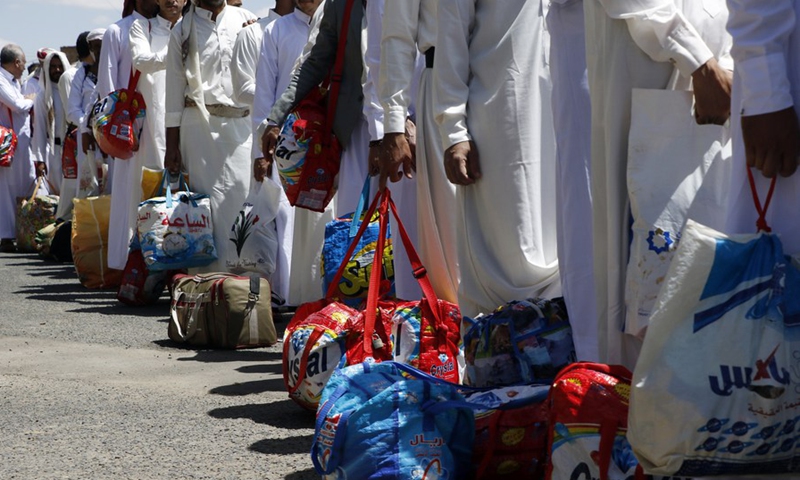Yemen’s warring sides agree to swap over 1,000 prisoners: UN mediator
Source: AFP Published: 2020/9/28 15:43:44

Prisoners wait to be released at a prison in Sanaa, Yemen, on Sept. 30, 2019. Yemen's Houthi group released on Monday 290 prisoners, the International Committee of the Red Cross (ICRC) said in a statement. (Photo by Mohammed Mohammed/Xinhua)
The warring sides in Yemen's long conflict have agreed to exchange 1,081 prisoners, the United Nations (UN) mediator said on Sunday following talks in Switzerland.Yemen's government, which is supported by a Saudi-led military coalition, and Iran-backed Huthi rebels resolved to swap some 15,000 detainees as part of a peace deal brokered by the UN in Stockholm back in 2018.
The two sides have since undertaken sporadic prisoner exchanges, but the release of over 1,000 loyalists and insurgents - if it materializes - would mark the first large-scale handover since the war erupted in 2014.
"I am personally extremely pleased to be here to announce that you have reached a very important milestone," UN envoy Martin Griffiths said at the end of the talks at the Swiss village of Glion, overlooking Lake Geneva.
Griffiths hailed the decision to release the prisoners as the largest such operation during Yemen's conflict.
He also congratulated the government and the Huthis for renewing their "commitment to the full implementation of the Stockholm agreement."
The Huthi-run Al-Masirah TV channel quoted a rebel source as confirming a deal had been reached and that both parties "express their commitment to implement the agreement."
"What matters to us is implementing the deal, not only signing it," senior rebel commander Mohamed Ali Al-Huthi had tweeted on Saturday.
Yemen's Foreign Minister Mohammad al-Hadhrami welcomed the deal as a "humanitarian" breakthrough, but also said in a tweet that "the government demands the agreement is implemented without stalling."
Dr Elisabeth Kendall, a research fellow at the University of Oxford's Pembroke College, said the deal was an "important trust-building measure" amid efforts to end the Yemen conflict, but one that would create more animosity if it faltered.
"This step has to be viewed positively, given how polarized the warring sides now are and how intractable the conflict has become," she told AFP.
"But there are several reasons to be wary... We have been here several times before. Prisoner swaps are agreed, then they come to nothing and those impacted end up even more frustrated and angry."
Sources on both sides indicated that it was to be implemented within two weeks.
The agreement includes the release of "681 rebels and 400 government forces [and allies], among them 15 Saudis and four Sudanese," a member of the government delegation told AFP.
AFP
Posted in: MID-EAST